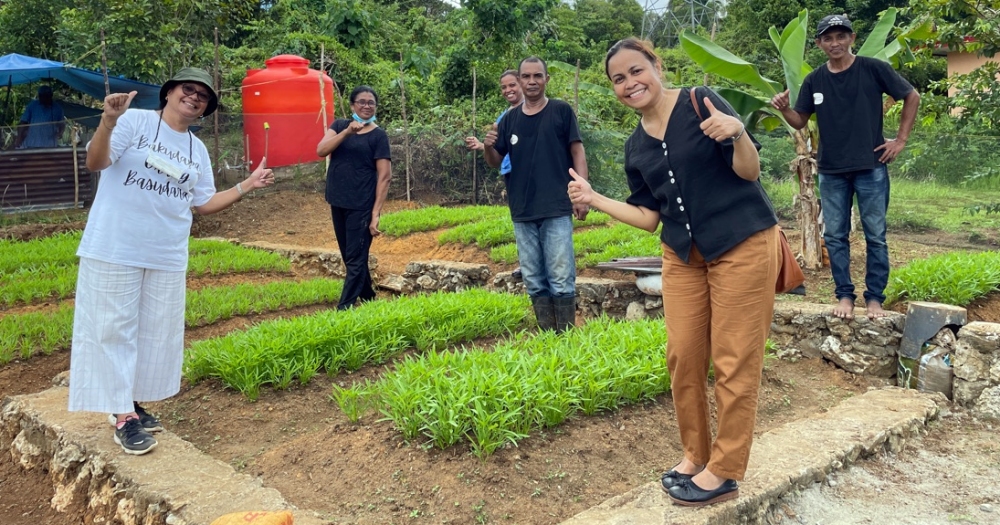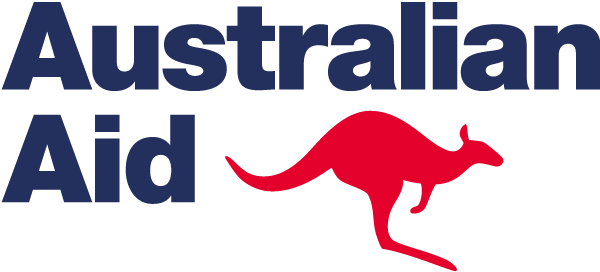Looking for other ways to donate? Click here
There's a food crisis in Maluku and Timor-Leste.
You can help.
In two of the poorest places in our region, there is a hidden food crisis being made worse by the rising cost of living.
Families are being forced to skip meals or to eat only low-nutrition food like plain rice or instant noodles. It’s causing malnutrition, stunting the growth of children, and leaving them vulnerable to avoidable diseases. In Timor-Leste, the prevalence of stunting from malnutrition in children under five is 47 percent, among the highest in the world. In Maluku, 34 percent of children under five are stunted.
We asked our partners how we could best help, and they told us they had a sustainable, local solution to the crisis:
Get people gardening!
Thousands of people. Growing kitchen gardens filled with fresh vegetables, right where they live.
It costs just $90 for a family to set up a kitchen garden on their own land or in a community space offered by the church. It covers a variety of seeds, tools, training sessions and ongoing support by our partner’s program teams.
Please give generously and together we can help our partners make a lasting difference.
Local action to beat the food crisis.
Maluku (in East Indonesia) and Timor-Leste are highly dependent on imports to meet their food needs.
Ukraine and Russia have historically been Indonesia’s main suppliers of wheat (a key ingredient for noodle, flour, and bread producers) and Timor-Leste imports most of its food from Indonesia, making it extremely vulnerable.
Experts say the global food situation is set to worsen with the impacts of the ongoing conflict, climate change and inflation and will continue to hit the poor the hardest.
Kitchen gardens are a locally led, sustainable solution to the food crisis that our partners hope to scale up each year to impact thousands of lives.
The project will be kickstarting local food production, improving the health of children and families; reducing food miles, pollution and reliance on foreign imports; connecting and educating local communities about nutrition; and building resilience to global food supply disruptions.

We started our garden by improving a vacant area that used to be landfill and, just a few months later, we now have sixteen garden beds filled with water spinach, kale, pumpkin and other vegetables on the way.
We feel like we grow as the garden grows.
We want that for the whole community.
~ Rev Jeny Mahupale, Protestant Church of Maluku
Read Rev Jeny's letter here.

Direct deposit / bank transfer
(click for details)
For direct banking, please arrange to deposit your donation into the following UnitingWorld Account:
Bank: Westpac – King St, Sydney NSW
Account Name: UnitingWorld Donations
Account Number: 182657
BSB: 032-014
Reference: "Food crisis"
IMPORTANT: On completion of your deposit, please forward an email to: info@unitingworld.org.au with the following details: the amount you deposited, to where you wish the funds be directed (e.g. "Food crisis"), to whom the receipt is to be made out to and the relevant contact details (address and phone number).
Thank you!
Privacy and transparency
All gifts of $2 or more are tax-deductible. Your personal information will only be used for the purpose for which it was collected and will never be disclosed to any person, body or agency except where required by law. Click here to read our full Privacy Policy. We hope to raise $80,000 to support our projects in Maluku and Timor-Leste. In the event that funds raised exceed the amount needed for a certain project, funds will be used for other UnitingWorld projects based on need.
All project photos by Rev Jeny Mahupale and her team with the consent of persons shown.
UnitingWorld is accredited by the Australian Department of Foreign Affairs and Trade (DFAT), responsible for managing Australia’s aid program. To maintain accreditation, UnitingWorld's systems, policies and processes are rigorously reviewed by the Australian Government.
UnitingWorld is also a member of the Australian Council for International Development (ACFID), which holds us to accountable to the highest standards of governance, financial transparency and effectiveness in our work.
We gratefully acknowledge the support of the Australian Government through the Australian NGO Cooperation Program (ANCP) and other programs.


Thank you for your support!
Together we'll make a big impact.







